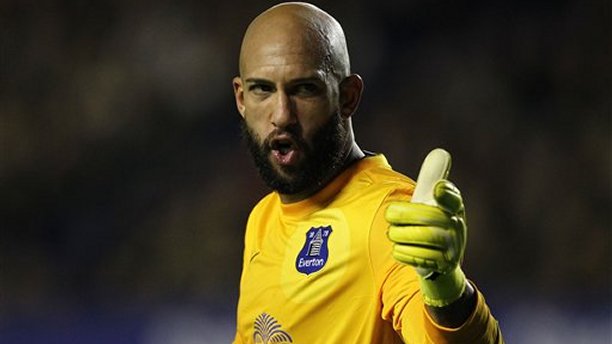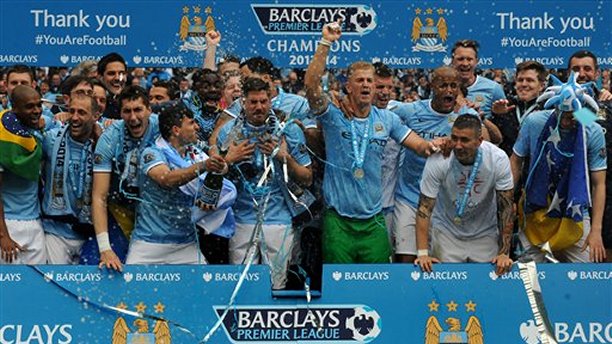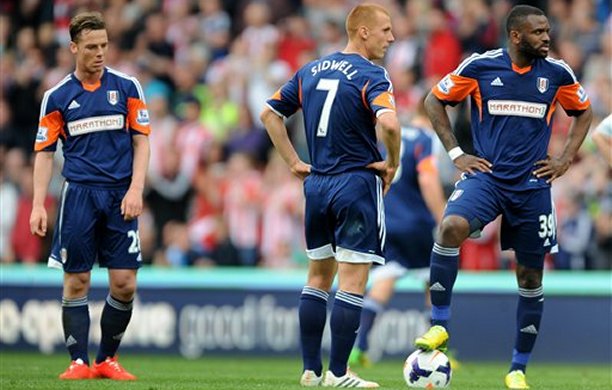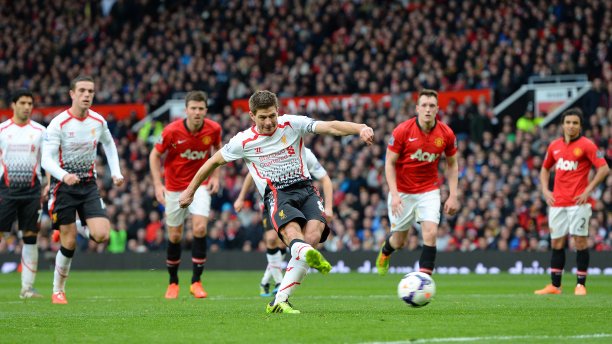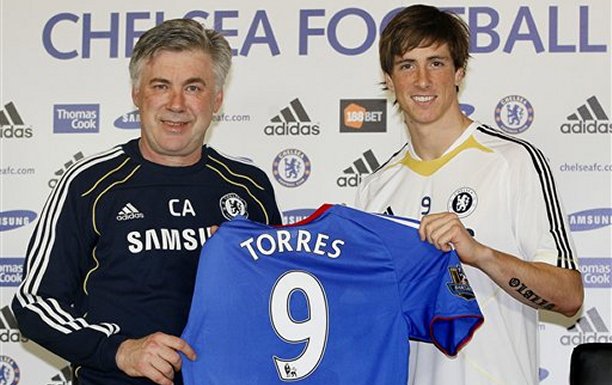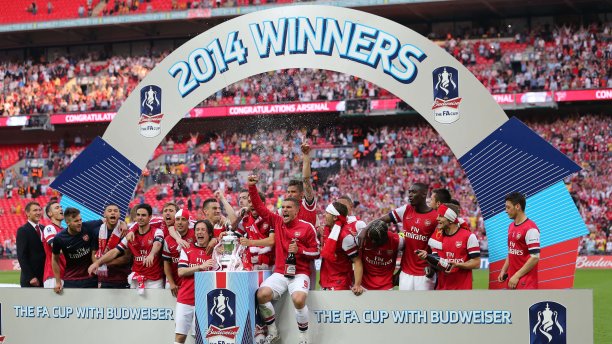
Space history made as Europe’s Rosetta becomes first probe to catch comet
August 15, 2014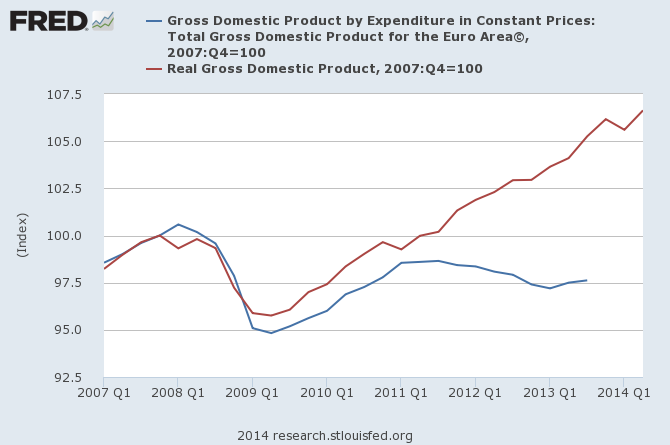
Europe is in an epic depression — and it’s getting worse
August 16, 2014Everton and USMNT goalkeeper Tim Howard (Pic: Rex Features/AP)
There’s never been a better time for Americans to get into soccer, after the success of the USMNT (U.S. Mens’ National Team) at the 2014 World Cup; and one of the most popular competitions in the world, the English Premier League, is widely available to viewers in the U.S. thanks to its live coverage on NBC.
But even if you know your corner kick from your offside, and even if you’re a seasoned fan of Major League Soccer, the way that the EPL works can be daunting to a newcomer. So, on the assumption that you at least know the basics about how the game is played, here are ten things about the Premier League that should help you get up to speed before the season starts this Saturday (August 16).
Points make prizes
Like many domestic soccer leagues the world over—but not the MLS—the question of who wins the Premier League is decided in a fairly straightforward fashion. A total of 20 teams each play every other team twice, over the course of a season that runs from August through May. A team is given three points for winning a match, and one point each for a tie (referred to in England as a “draw”). If two or more teams are on the same number of points, then a hierarchy of factors are used to separate them. First comes “goal difference”, which is the figure obtained by deducting a team’s number of goals conceded from its goals scored. Teams on the same goal difference, meanwhile, are then separated purely by goals scored.
Manchester City, the reigning Premier League champions (Pic: Rui Vieira/AP)
The team that finishes at the top of the league after everybody has played their 38 matches are crowned Premier League Champions. There is no playoff system to determine the winner, unless two (or more) teams finish at the top with exactly the same number of points, goal difference and goals scored. This has never actually been necessary in the history of English soccer, though, so not many people even know it’s the rule.
First is everything. Fourth is… also pretty important
Winning the Premier League is, of course, the ultimate prize for all 20 teams involved, but almost as important is the race to finish somewhere in the top four positions. The most lucrative reward for success in the EPL is the chance to compete in the UEFA Champions League (formerly known as the European Cup), a Europe-wide competition for the continent’s elite clubs. Each year, every member nation submits a certain number of teams to compete in the tournament, and fixtures are played alongside the regular season, usually on midweek evenings. The number of teams each league contributes is dependent on their success in previous years, and at the moment the EPL has four spaces.
Simply playing in the Champions League, never mind winning it, offers huge financial reward due to the lucrative television and sponsorship deals the competition possesses. As such, finishing in the top four is a major target for many English clubs, as the increased funding can help establish them as one of the league’s power teams.
The EPL is the tip of the iceberg
The Premier League is merely the top division in a vast and extensive English league system, known informally as “the pyramid.” Prior to the formation of the Premier League (which was created as a breakaway entity in 1992), the English Football League consisted of four divisions comprising 92 clubs. That system is still in place, but now the Premier League, which is governed separately, sits atop the three Football League divisions (which are, confusingly, known in descending order as the Championship, League One and League Two). Below the League, which is entirely professional, there is a semi-professional league known as the Conference (made up of three divisions), and below that there are all manner of regional amateur and semi-pro leagues that feed upwards into the system. All in all, it’s estimated that around 7,000 teams in England are part of this system, and thus could feasibly (in the right circumstances) become a Premier League club one day.
Nobody is safe
Fulham FC was relegated in 2014 after 13 years in the Premier League (Pic: Rui Vieira/AP)
Unlike in most American sports, being in the Premier League is a privilege, not a right. Once a team is there, they don’t automatically stay there—they have to play for their position. Each year, the bottom three sides in the league are relegated to the top division of the Football League, to be replaced by three teams from it. A club’s previous success or overall popularity are no protection against dropping out of the league, and many of the 22 clubs that first founded the division back in 1992 have long since departed it, never to return. Some have even dropped all the way to League Two, although no club that has competed in the Premier League has yet dropped out of the Football League system.
Not all the teams are English
One team that has enjoyed a remarkable rise to the Premier League is Swansea City, who were briefly in 92nd place in the League during the 2002/03 season, yet gained promotion to the EPL in 2011 and have remained there since. But hang on, you might be asking: Swansea? Isn’t that in Wales? Yes, it is.
Due to the comparatively small size of Wales’ own league system, there are a total of six Welsh clubs who have opted (and been accepted) to instead play in the English system. None of them had ever played in the Premier League until Swansea’s promotion, but they were also joined by Cardiff City for the 2013/14 season. Sadly (at least as far as Welsh pride goes), Cardiff were relegated back down again after just one year.
The other British nations, Scotland and Northern Ireland, also have their own leagues. Every so often the topic of whether or not Scotland’s two most successful clubs — Celtic and Rangers — might break ranks and join the English league comes up for debate, but so far it’s never progressed beyond speculation.
There’s an established order…
There are no natural levelers in English soccer: success usually breeds success, because the quickest way to win things is to have the most money, and the teams who win the most things end up earning even more money. As such, there are a handful of teams who in any given era will likely spend several years in a row competing for the top honors. Manchester United is by far the most successful side of the Premier League era, having won the title 13 times since 1992, having already also won the old league seven times beforehand. Throughout the 1990s, their most regular challenger was Arsenal, who won three championships, and in the 2000s, the new financial backing gained by Chelsea saw them win it three times as well. Manchester City recently entered that group due to the wealth of their current owners, who bought them in 2008 and have so far yielded two championships.
Manchester United (in red) versus Liverpool (white) in 2014 (Pic: AP)
Traditionally the most successful club in England, Liverpool has yet to win a championship in the Premier League era, but has challenged for it on a handful of occasions, most notably last season. Until Manchester City’s newfound wealth arrived, the other four had something of a lockout on the Champions League positions each year, earning them the nickname of the “Big Four.”
… but it does get mixed up sometimes
A variety of circumstances can mean that a club that would usually compete for the title might have a poor year and drop out of the reckoning entirely, such as Manchester United did last season, when after a change of manager they went from reigning champions to finishing seventh. Similarly, it’s not unheard of for a team that would usually be considered lower order to make their way into the top half of the league, and even challenge for the European qualification positions. These power shifts are usually fleeting, but it’s possible for a club to change its longer-term status. Everton, for example, was very nearly relegated on several occasions in the 1990s, but would now consider it a huge disappointment to finish lower than tenth.
One attempt to correct the imbalance at the top of the sport has been the Europe-wide introduction of Financial Fair Play rules, or FFP. This limits the amount of money a club can spend without being independently profitable, and is intended to stop rich owners simply throwing more money at player purchases and contracts.
Everyone loves Transfer Deadline Day
The movement of players between soccer clubs, in England and the rest of the world, is done almost exclusively on a cash basis, as there is no draft system in soccer (outside that regular exception, the MLS) and no centralized finance system. Clubs can simply buy and sell players for whatever prices they agree (which, in the Premier League, can be anything from $1 million to $100 million), although a player whose contract has expired may generally leave for another club without a fee being paid, thanks to European employment law.
Fernando Torres (right) signed for Chelsea for a fee of £50m ($83m) on Deadline Day in January 2011 (Pic: AP)
For many years, players in England could be bought and sold at any time (except for a short period towards the end of the season), but in 2002 a “transfer window” system was introduced at the behest of FIFA, world soccer’s governing body. This means that clubs can now only register new players between July 1 and August 31, and between January 1-31, of a given year. This has spawned the culture of “Transfer Deadline Day,” the last day of the window, on which many clubs race to complete last-minute deals, and fans stay tuned to 24-hour sports news networks in the hope of hearing about an exciting new signing.
The League is not the only prize on offer
As well as the Premier League, all English clubs compete in the FA Cup, which is the oldest soccer competition in the world, having first taken place in 1871. It’s a simple knockout competition, in which teams are randomly drawn to play one-another in a succession of rounds. 736 teams compete each year, but Premier League teams get to skip the earliest rounds and enter at a point where only 64 clubs remain. The FA Cup Final used to be the showpiece event at the end of the English season, but due to the low financial rewards offered by the tournament, it has lost some of its prestige over the last two decades, especially among younger fans. Nevertheless, winning the Cup is still seen as a significant achievement, particularly for clubs without any chance of winning the EPL.
Arsenal won the FA Cup in 2014 (Pic: AP)
The third English competition is the League Cup (usually referred to by the name of its sponsor, and so currently known as the Capital One Cup). This is competed for by the 92 League clubs, again in a knockout format, and again the EPL teams get to enter at a slightly later stage. This tournament carries less prestige than the FA Cup, and the final takes place earlier in the season.
Winning either competition also grants a team entry into the next season’s Europa League, which is UEFA’s secondary competition, although a club cannot compete in both the Champions League and Europa League in the same season. The team that finishes fifth in the Premier League also gets to play in the Europa, and if either or both of the cup winners are also Champions League qualifiers, then that reward may also be extended to the sixth- and/or seventh-placed finishers.
Jason Sudeikis is not the Tottenham Hotspur coach
Despite the amusing videos that NBC produced to promote their coverage this year and last:
That’s not to say, however, that there’s nobody of interest if you’re looking for home representatives in the league. The number of high-profile American players in the EPL has diminished over the last few seasons, as neither Clint Dempsey nor Landon Donovan are likely to return any time soon. But perhaps the most famous U.S. soccer player of all right now, Tim Howard, remains first choice goalkeeper at Everton.
Three other members of the 2014 U.S. World Cup squad are also Premier League regulars: goalkeeper Brad Guzan at Aston Villa, defender Geoff Cameron at Stoke City, and striker Jozy Altidore at Sunderland. And at the astonishing age of 43, the great Brad Friedel is still a registered player at Tottenham, although the goalkeeper is unlikely to get much if any game time this season.
Plenty of players from other nations who caught the eye during the World Cup also earn their weekly living in the Premier League. Chilean striker Alexis Sanchez has just joined Arsenal, and Didier Drogba of the Ivory Coast has rejoined Chelsea for a second spell, having been one of their most legendary players between 2004 and 2012. Prolific goalscorer Robin van Persie leads the line for Manchester United, while German World Cup winners Mesut Özil and André Schürrle play for Arsenal and Chelsea respectively. All twenty clubs have their cosmopolitan sides, however: it was estimated that at the beginning of last season, only 207 of 566 registered players were English, and that a total of 67 different nations were represented. It may be referred to as the “English” Premier League, but it’s arguably the most global sporting league in the world.
Will you be watching the Premier League? Which team will you support?
See more:
Mind the Gap: Team by Team Premier League Preview
What Britain’s Premier League Could Learn From U.S. Sports Culture
Brit Binge Watching: Five Football Films Now Streaming Online

